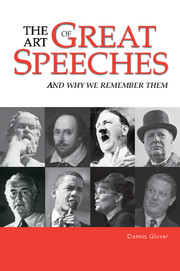Book contents
- Frontmatter
- Contents
- Speeches
- Photographs
- Acknowledgements
- Introduction
- Chapter 1 To save a republic
- Chapter 2 Speech – the essence of democracy
- Chapter 3 Forum
- Chapter 4 Style
- Chapter 5 Emotion
- Chapter 6 Character
- Chapter 7 Evidence
- Chapter 8 Morality
- Chapter 9 Gettysburg
- Chapter 10 Speechwriter
- Conclusion: The ideal orator
- Appendix Common figures and terms
- Notes
- Index
- Frontmatter
- Contents
- Speeches
- Photographs
- Acknowledgements
- Introduction
- Chapter 1 To save a republic
- Chapter 2 Speech – the essence of democracy
- Chapter 3 Forum
- Chapter 4 Style
- Chapter 5 Emotion
- Chapter 6 Character
- Chapter 7 Evidence
- Chapter 8 Morality
- Chapter 9 Gettysburg
- Chapter 10 Speechwriter
- Conclusion: The ideal orator
- Appendix Common figures and terms
- Notes
- Index
Summary
From the preceding chapters, one might assume that by employing style, projecting character and appealing to emotion, the gifted orator or speechwriter could produce a great speech by saying anything or nothing. It's true that technique alone can produce wittiness. Take the cheeky speech made by the sixteen-year-old William Hague to the British Conservative Party conference in Blackpool in 1977:
There is at least one school, I think it is in London, where the pupils are allowed to win just one race each, for fear that to win more would make the other pupils seem inferior. That is a classic illustration of the socialist state which draws nearer with every Labour government and which conservatives have never reversed. It's all right for some of you [WAVING TOWARDS THE AUDIENCE AND MRS THATCHER]; half of you won't be here in 30 or 40 years’ time! [LAUGHTER, APPLAUSE]
It thrilled the audience, including Mrs Thatcher, and set Hague up for a lifetime of invitations and income from the professional speaking circuit. His speaking abilities also helped him become the leader of the Tory party. It's also an excellent example of how to use humour to connect with the forum. But great? No.
As Aristotle recognised, the character of the speaker and the emotional disposition of the audience provided only part of the speech's proof. A third set of qualities was required; qualities inherent to the speech itself: purpose, substance, structure, evidence, logic; or what the Greeks called logos.
- Type
- Chapter
- Information
- The Art of Great SpeechesAnd Why We Remember Them, pp. 188 - 208Publisher: Cambridge University PressPrint publication year: 2010



